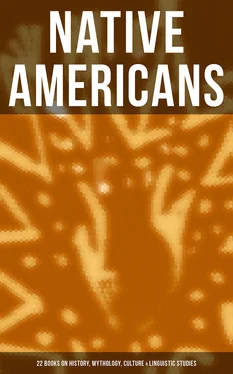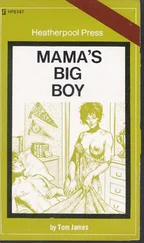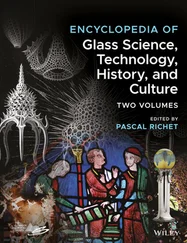Ititaujang answered, “You must eat of the whale; that will fill your stomach.” Then she began crying and exclaimed, “I will not eat it; I will not soil my nice white clothing.”
She descended to the beach, eagerly looking for birds’ feathers. Having found a few she put them between her fingers and between those of her child; both were transformed into geese and flew away.
When the Inuit saw this they called out, “Ititaujang, your wife is flying away.” Ititaujang became very sad; he cried for his wife and did not care for the abundance of meat and blubber, nor for the whales spouting near the shore. He followed his wife and ascended the land in search of her.
After having traveled for many weary months he came to a river. There he saw a man who was busy chopping chips from a piece of wood with a large hatchet. As soon as the chips fell off he polished them neatly and they were transformed into salmon, becoming so slippery that they glided from his hands and fell into the river, which they descended to a large lake near by. The name of the man was Eχaluqdjung (the little salmon).
On approaching, Ititaujang was frightened almost to death, for he saw that the back of this man was altogether hollow and that he could look from behind right through his mouth. Cautiously he crept back and by a circuitous way approached him from the opposite direction.
When Eχaluqdjung saw him coming he stopped chopping and asked, “Which way did you approach me?” Ititaujang, pointing in the direction he had come last and from which he could not see the hollow back of Eχaluqdjung, answered, “It is there I have come from.” Eχaluqdjung, on hearing this, said, “That is lucky for you. If you had come from the other side and had seen my back I should have immediately killed you with my hatchet.” Ititaujang was very glad that he had turned back and thus deceived the salmon maker. He asked him, “Have you not seen my wife, who has left me, coming this way?” Eχaluqdjung had seen her and said, “Do you see yon little island in the large lake? There she lives now and has taken another husband.”
When Ititaujang heard this report he almost despaired, as he did not know how to reach the island; but Eχaluqdjung kindly promised to help him. They descended to the beach; Eχaluqdjung gave him the backbone of a salmon and said, “Now shut your eyes. The backbone will turn into a kayak and carry you safely to the island. But mind you do not open your eyes, else the boat will upset.”
Ititaujang promised to obey. He shut his eyes, the backbone became a kayak, and away he went over the lake. As he did not hear any splashing of water, he was anxious to see whether the boat moved on, and opened his eyes just a little. But he had scarcely taken a short glimpse when the kayak began to swing violently and he felt that it became a backbone again. He quickly shut his eyes, the boat went steadily on, and a short time after he was landed on the island.
There he saw the hut and his son playing on the beach near it. The boy on looking up saw Ititaujang and ran to his mother crying, “Mother, father is here and is coming to our hut.” The mother answered, “Go, play on; your father is far away and cannot find us.” The child obeyed; but as he saw Ititaujang approaching he re-entered the hut and said, “Mother, father is here and is coming to our hut.” Again the mother sent him away, but he returned very soon, saying that Ititaujang was quite near.
Scarcely had the boy said so when Ititaujang opened the door. When the new husband saw him he told his wife to open a box which was in a corner of the hut. She did so, and many feathers flew out of it and stuck to them. The woman, her new husband, and the child were thus again transformed into geese. The hut disappeared; but when Ititaujang saw them about to fly away he got furious and cut open the belly of his wife before she could escape. Then many eggs fell down.
The Emigration of the Sagdlirmiut
Table of Contents
In the beginning all the Inuit lived near Ussualung, in Tiniqdjuarbing (Cumberland Sound). The Igdlumiut, the Nugumiut, and the Talirpingmiut in the south, the Aggomiut in the far north, and the Inuit, who tattoo rings round their eyes, in the far west, all once lived together. There is a tradition concerning the emigration of the Sagdlirmiut (see p. 451) who live east of Iglulik. The Akudnirmiut say that the following events did not happen in Tiniqdjuarbing, but in Aggo, a country where nobody lives nowadays. Ikeraping, an Akudnirmio, heard the story related by a Tununirmio, who had seen the place himself, but all the Oqomiut assert that Ussualung is the place where the events in the story happened.
An old woman, the sister of Mitiq, the angakoq, told the story as follows:
Near Ussualung there are two places, Qerniqdjuaq and Eχaluqdjuaq. In each of these was a large house, in which many families lived together. They used to keep company during the summer when they went deer hunting, but returned to their separate houses in the fall.
Once upon a time it happened that the men of Qerniqdjuaq had been very successful, while those of Eχaluqdjuaq had caught scarcely any deer. Therefore the latter got very angry and resolved to kill the other party, but they preferred to wait until the winter. Later in the season many deer were caught and put up in depots. They were to be carried down to the winter settlements by means of sledges.
One day both parties agreed upon a journey to these depots and the men of Eχaluqdjuaq resolved to kill their enemies on this occasion. They set out with their dogs and sledges, and when they were fairly inland they suddenly attacked their unsuspecting companions and killed them. For fear that the wives and children of the murdered men might be suspicious if the dogs returned without their masters, they killed them too. After a short time they returned and said they had lost the other party and did not know what had happened to them.
A young man of Eχaluqdjuaq was the suitor of a girl of Qerniqdjuaq and used to visit her every night. He did not stop his visits now. He was kindly received by the woman and lay down to sleep with his young wife.
Under the snow bench there was a little boy who had seen the young man of Eχaluqdjuaq coming. When everybody was sleeping he heard somebody calling and soon recognized the spirits of the murdered men, who told him what had happened and asked him to kill the young man in revenge. The boy crept from his place under the bed, took a knife, and put it into the young man’s breast. As he was a small boy and very weak, the knife glided from the ribs and entered deep into the heart, thus killing the young man.
Then he roused the other inhabitants of the hut and told them that the spirits of the dead men had come to him, that they had told him of their murder, and had ordered him to kill the young man. The women and children got very much frightened and did not know what to do. At last they resolved to follow the advice of an old woman and to flee from their cruel neighbors. As their dogs were killed, the sledges were of no use, but by chance a bitch with pups was in the hut and the old woman, who was a great angakoq, ordered them to go and whip the young dogs, which would thus grow up quickly. They did so and in a short time the pups were large and strong. They harnessed them and set off as quickly as possible. In order to deceive their neighbors they left everything behind and did not even extinguish their lamps, that they might not excite suspicion.
The next morning the men of Eχaluqdjuaq wondered why their companion had not returned and went to the hut in Qernirtung. They peeped through the spy hole in the window and saw the lamps burning, but nobody inside. At last they discovered the body of the young man, and, finding the tracks of the sledges, they hurriedly put their sledges in order and pursued the fugitives.
Читать дальше












